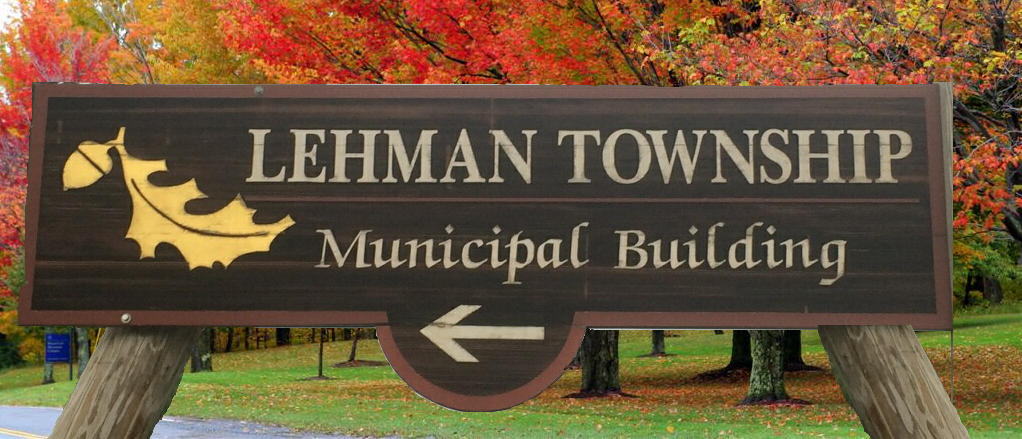Important Phone Numbers
| Fire and Ambulance | …………………….911 |
| Poison Control Center | ……..1-800-722-7112 |
| Pocono Medical Center | ……….570-421-4000 |
| Township Office | ……….570-588-9365 |
| Pike County Administration Bldg | ……… 570-296-7744 |
| Bushkill Post Office | ………570-588-6514 |
| Income Maintenance Line | …… 1-800-692-7462 |
| Public Utility Commission Hotline | …… 1-800-782-1110 |
| Higher Education Assistance Agency | …… 1-800-692-7392 |
Click below for more information *Please note to open document you will need adobe acrobat or any other pdf reader.
Lehman Township Open Space and Recreation Plan DRAFT
PA Municipal Waste Planning. Recycling & Waste Reduction Act of 1988 Act 101
H.A. Berkheimer Tax Administrator
In Pennsylvania, the General Assembly has empowered political subdivisions of the Commonwealth, at the local level, to levy, assess, and collect certain types of taxes for general revenue purposes. The authority for levying these non-realty taxes was granted to local school districts and municipalities in 1965 through the passage of the Local Tax Enabling Act (LTEA), commonly referred to as “Act 511”.
The Earned Income Tax is sometimes called a “wage tax”. It is one of the more popular taxes levied by various local tax authorities (i.e., township, borough, school district) around the state. Earned Income is defined as salaries, wages, commissions, bonuses, incentive payments, fees, tips and other compensation received by an individual for services rendered, whether in cash or in property, and whether paid directly to you or through an agent.
Non-cash compensation is also subject to the Earned Income Tax under Act 511, such as vacation, holiday, severance and annual leave pay, personal use of company cars, cafeteria and welfare benefit plan programs provided by the employer, and, in general, any other non-cash benefits accruing from employment. Employer contributions to an employee’s Simplified Employment Pension, Keogh, 401(k), Individual Retirement Account, or other type of tax deferred annuity plan, will be considered taxable income to the employee, where the employee voluntarily elects to have the employer deduct said contributions from his salary. The employee’s own contributions to these type of plans, through a salary reduction, are taxable income to the employee; only where an employer contributes to these sort of plans as a matter of course and without choice to the employee, are these types of contributions non-taxable.
Section 8 of The Local Tax Enabling Act sets a maximum rate limitation of one (1%) percent which may be imposed. It is subject to the “halving provisions” of Act 511 where two coterminous taxing bodies impose an earned income tax.
In addition, the Net Profits of a business are subject to a Net Profits tax. “Net Profits” are defined as the net income from the operation of a business, profession, or other activity, except corporations, after deductions for all operating costs and expenses incurred in conducting said businesses.
Based upon the above-cited definitions of Earned Income and Net Profits, the following is a list of income payments and benefits generally recognized as NOT being subject to taxation:
* Sick or disability payments
*Military payments
*Workmen’s compensation
*Death benefits
*Public assistance
*Gifts and bequests
*Passive income
*Social Security / pensions
*Employer contributions
*Unreimbursed employee expenses
Act 511 defines “taxpayer” as a person, partnership, association, or other entity required hereunder to file a return of earned income or net profits, or to pay a tax thereon. This would include individuals, sole proprietorship businesses, partnerships, associations and employers, including corporate employers.
All taxpayers must file a final return by April 15 of each year. If a taxpayer did not in the jurisdiction listed on the final return for the entire year, they are required to file for the period of time that they lived in that jurisdiction, and prorate their income, expenses, withholding, etc. State law, as well as the local tax resolutions and/or ordinances, make it a summary criminal offense if a taxpayer fails to file a tax return as required.
NEW BUSINESS:
You need to contact Berkheimer, as the Tax Administrator for Lehman Township, and request an Employer Registration Form. After the registration form is processed, they will send you an Employer’s Quarterly Tax return. After your initial filing, the return will be pre-printed with your employees, names, address, social security number, tax jurisdiction and amount of tax withheld.
As long as you are an employer located in Lehman Township, you must, by law, withhold the tax and file the Employer’s Quarterly Earned Income Tax Return (form E-1) quarterly, normally with the due date of April 31, October 31, July 31, and January 31. The return and any tax payment due should be mailed to Berkheimer, P.O. Box 900, Bangor, PA 18013
If an employer fails to file a tax return as required by State Law, as well as the local tax resolutions and/or ordinances, the employer is subject to a fine not to exceed $500 per offense, plus the cost of prosecution. If the tax is not paid, a civil suit may be used to collect the tax due along with any penalties and interest that was assessed. If the tax is not withheld, every employer who willingly or negligently fails or omits to make the deductions, shall be liable for payments of the taxes that he was required to withhold to the extent that such taxes have not been recovered from the employee. In addition, any employer who fails to withhold or remit taxes for two of the four preceding quarters can be required to file on a monthly basis.
For further information or questions, see Berkheimer’s website (www.hab-inc.com).
